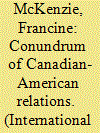| Srl | Item |
| 1 |
ID:
129554


|
|
|
|
|
| Publication |
2014.
|
| Summary/Abstract |
Forty years ago, political scientist Denis Stairs published The Diplomacy of Constraint, an account of Canadian involvement in the Korean War. Stairs explored the attempts of Canadian politicians, diplomats, and bureaucrats to constrain US intervention in Korea and, more generally, to influence the conduct of its foreign policy in the pressurized context of the early Cold War. Since then, historians and political scientists have continued to publish accounts of Canadian involvement in the Korean War and books on Canada-US relations in general. Why, then, should someone read The Diplomacy of Constraint today when there are more recent analyses? This review essay attempts to explain the longevity and usefulness of Stairs' study. What have scholars learned from Stairs' interpretation and approach? Has he influenced subsequent academic analyses? Can his study be considered a model of interdisciplinary scholarship? Finally, is new scholarship intrinsically better than old?
|
|
|
|
|
|
|
|
|
|
|
|
|
|
|
|
| 2 |
ID:
135100


|
|
|
|
|
| Summary/Abstract |
Canada’s non-acquisition of nuclear weapons in the immediate postwar period represents an important puzzle. Acquisition of an independent nuclear arsenal presented Canada with an unprecedented opportunity to ameliorate its objective insecurity vis-à-vis US power. Many theories suggest that when combined with Canada’s postwar capabilities, this insecurity ought to have pushed Canada toward acquisition. I argue that Canada’s non-acquisition of nuclear weapons can only be accounted for by an explanation that recognizes the importance of trust. To do so, I develop a conceptual framework for understanding trust in international politics. Drawing on research from psychology, economics, and even neurology, I develop a model that shows how narratives like liberalism can render trusting behaviour reasonable for agents, and how five mechanisms can generate the conditions required for trust to obtain. By applying this model to the Canada–US relationship I provide an explanation for Canada’s non-acquisition that is superior to existing accounts.
|
|
|
|
|
|
|
|
|
|
|
|
|
|
|
|